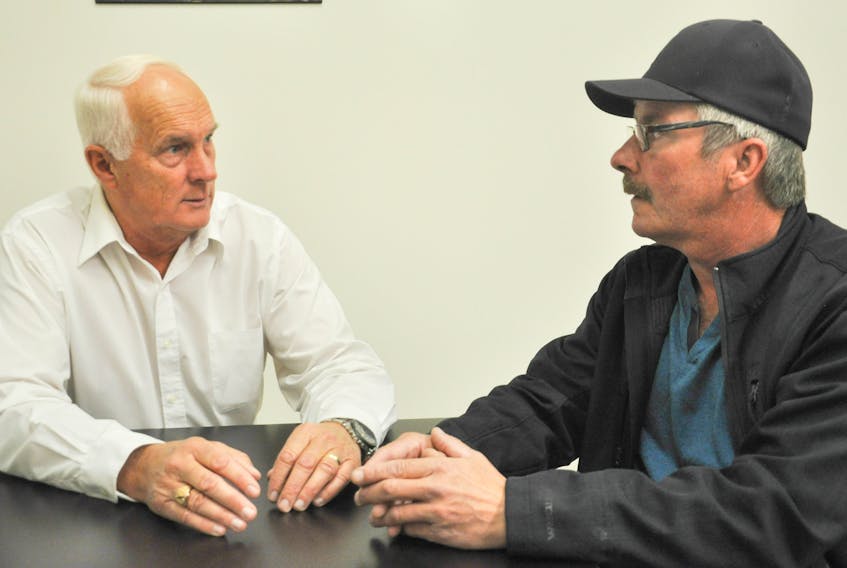NEW GLASGOW
Darrell MacKinnon is deeply frustrated with the Workers’ Compensation Board (WCB) of Nova Scotia.
As a power line worker with Emera, MacKinnon never missed a day of work – until an injury that required knee surgery in the winter of 2012. Although the surgery was a success, the effects of the injury on his knees and gait continued, until the point where he was let go from his job.
Since that point, MacKinnon has been in a struggle with the Workers’ Compensation Board of Nova Scotia to get the support that he and Pictou Centre MLA Pat Dunn believe he deserves.
MacKinnon’s injuries afflicted him with a limp for the year he had to wait for his knee surgery. After he healed up, MacKinnon’s walk has was still affected, with problems arising in the months after his surgery. What turned out to be a neurological disorder with his knees was not enough to require support from the WCB.
When MacKinnon sought compensation from the WCB, he was denied, and “ever since then, I have been fighting them,” he said.
“After you deal with a diagnosis, you have to deal with the strain of them denying you, and putting your family through torment and misery,” said MacKinnon. “They almost want you to turn around, crawl under a tree and die.”
Dunn’s response to MacKinnon’s complaint was to immediately start a discussion of the matter – privately with the minister responsible for the WCB, and in question period in legislature – to get to the root of the problem.
“The bottom line is that the Workers’ Compensation Board was not accountable,” said Dunn. “They continue to deny our top specialists in the province, who provide reports ruling in favour of the worker.”
Dunn believes that MacKinnon’s plight is part of a much larger trend of people being treated unfairly by the WCB, “seeing a specialist, getting asked to get more evidence, getting more evidence and getting denied again.”
This pattern continues, Dunn noted, until people run out of resources to continue pursuing compensation.
“We’re not saying that every injured worker should get compensation – that would be unreasonable. There are cases that should be denied too, but there are people who should be receiving benefits who are not,” said Dunn.
In their assessment, the WCB denied that the problem with MacKinnon experiences with his knees was connected to the injury he sustained and got surgery for.
This kind of mistake, Dunn said, is the result of under-qualified staff with no education or experience, disregarding or dismissing medical evidence, noting that, “they don’t have to go to medical school or anything close to it. They’re looking at specialist reports, and denying the injured workers.”
“They may send the injured workers to independent doctors, and … the doctor sometimes works for the Workers’ Compensation Board or does a lot of cases for the Workers’ Compensation Board,” Dunn added.
Dunn believes that such a lack of accountability creates a serious problem for workers – so in light of that, he introduced a bill into the house during the fall session of legislature, which is “basically a bill that says that if any member or official involved in decision making with the Workers’ Compensation Board aren’t acting in good faith, they have to be held accountable for decisions and actions.”
While in legislature, Dunn also questioned Labi Kousoulis, the minister responsible for Workers’ Compensation, about the lack of accountability of agents, employees and representatives with the WCB.
Kousoulis responded by saying that he expects all workers employed by the WCB to abide by the rules, indicating that he doesn’t expect them to be engaged in activities that aren’t under the act. Kousoulis noted that the WCB does have medical professionals on its board, whose expert testimony is heeded.
“Darrell has been denied continuously, through every possible avenue he’s tried,” said Dunn. “And what continues to annoy me is that I knew that the WCB was ignoring his rights, not giving him the opportunity to prove that he suffered an injury, and as a result, is unable to continue to do the type of work he was doing.”
Over the last few years, Dunn said a troubling trend has emerged, when other constituents came forward with the same problems, with “a consistent theme,” in which the Workers’ Compensation Board “does everything in their power to wear down the person to the point where they just give up, and they don’t have the finances to go ahead and fight any further.”
In response to the plight of MacKinnon and those who face similar problems – and the attention Dunn brought to the matter – Premier Stephen McNeil has requested that the Nova Scotia auditor general do a complete audit of the system through which the WCB operates.
Dunn believes that is a step in the right direction, having consulted MLAs from all three parties, and seeing consistency in the complaints they receive – denial and delays from the WCB.
“We’ve gotten calls from Ontario, P.E.I. and Cape Breton, and it’s just like it was talking to Darrell,” said Dunn.
Denise Corra, a representative for the WCB, responded to an email request, writing that WCB doesn’t comment on specific claims.
Corra stated that a case manager determines whether a worker has suffered a recurrence of a compensable injury. The case manager considers whether there is medical evidence that the return or increase in a disability, or symptoms, is related to the original compensable injury – or the treatment prescribed for that injury.
“If a worker disagrees with a claim decision, they may file an appeal within 30 days of receiving a written decision,” wrote Corra. “The appeal process is not intended as a second look at the entire claim. The process exists to review specific errors or oversights.”









